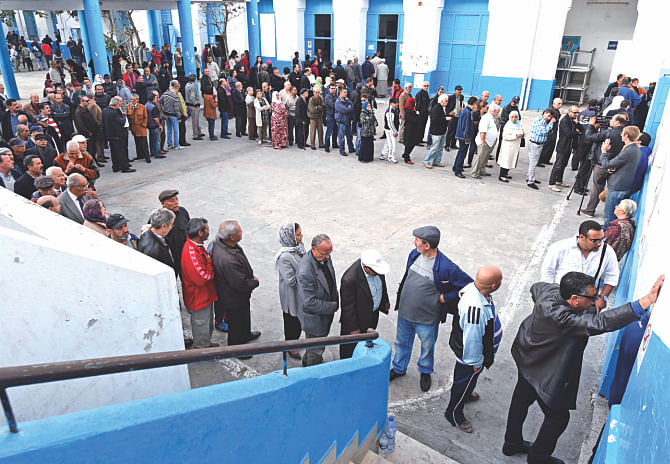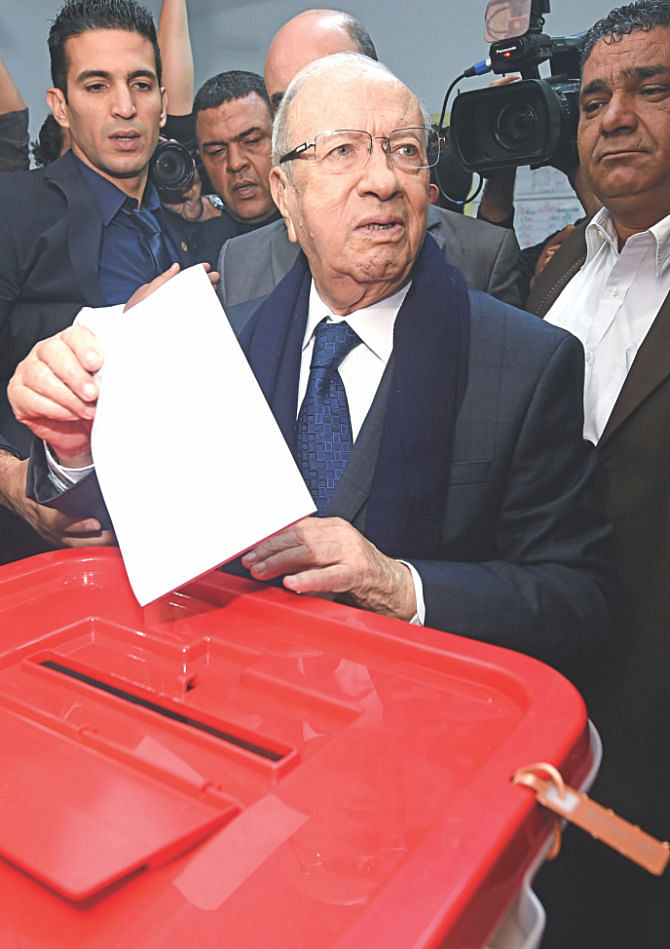Tunisia votes in landmark presidential election
Tunisia votes in landmark presidential election

Tunisians yesterday voted in their first presidential election since the 2011 revolution that sparked the Arab Spring, in a ballot set to round off an often fraught transition to democracy.
Among the 27 candidates the favourite is former premier Beji Caid Essebsi, an 87-year-old veteran whose anti-Islamist Nidaa Tounes party won a parliamentary election last month.
Others vying for the presidency include outgoing President Moncef Marzouki, several ministers who served under ousted dictator Zine El Abidine Ben Ali, leftwinger Hamma Hammami, business magnate Slim Riahi and a lone woman, magistrate Kalthoum Kannou.
Prime Minister Mehdi Jomaa hailed the vote.
"It's a historic day, the first presidential election in Tunisia held under advanced democratic norms," Jomaa said. "God willing, it will be a great festival of democracy."

Some 5.3 million people are eligible to vote, with tens of thousands of police and troops deployed to guarantee security amid fears Islamist militants might seek to disrupt polling day.
Polling hours were restricted to just five in some 50 localities close to the Algerian border, where armed groups are active. Everywhere else, polls were due to close at 1700 GMT.
A run-off vote will be held at the end of December if no one secures an absolute majority.
Jomaa, who heads a caretaker government of independents charged with overseeing the completion of Tunisia's transition, has repeatedly contrasted its relative peacefulness with the violence rocking other Arab Spring countries.
The election represents "hope, a big hope for the region," Jomaa told AFP during a last-minute inspection of polling stations late on Saturday.
"We were the first to enter into this cycle of change which they have called the Arab Spring. We will be the first (to make the transition) but others will follow," he said.
Tunisia has won international plaudits for largely steering clear of the violence, repression and lawlessness of other Arab Spring countries such as neighbouring Libya.
Until the revolution, Tunisia knew only two presidents -- Habib Bourguiba, the "father of independence" from France in 1956, and Ben Ali, who deposed him in a 1987 coup.
To prevent the emergence of another dictatorship, presidential powers have been restricted under a new constitution, with executive prerogatives transferred to a premier drawn from parliament's top party.
Frontrunner Essebsi has run on a campaign of "state prestige", a slogan with wide appeal to Tunisians anxious for an end to instability.
Supporters argue only he can stand up to the Islamists who first held power in the post-Ben Ali era, but critics charge he is out to restore the old regime, having served under both former presidents.
"Long live Tunisia," Essebsi said as he cast his ballot at polling station in a Tunis suburb, where he was among the first to vote.
A driver in his 30s who gave his name only as Moez told AFP that he had volunteered as an electoral observer because of the importance of the vote.
"This election is very important. It's the culmination of the revolution and something that we really should not pass up," he said.
Outgoing president Marzouki has been hammering home the argument that he is the only leader capable of preserving the gains of the uprising, and has said Sunday's vote is the "last stand" for the old guard.
Moderate Islamist party Ennahda, which came second in the parliamentary election, has not put up a candidate and has invited its members "to elect a president who will guarantee democracy".
Speculation has been rife on the make-up of a new government and the possibility of a coalition between Nidaa Tounes and Ennahda despite their fundamental differences.
Whoever wins, tackling the faltering economy will be a top priority, with unemployment, a leading cause of the revolution, running at 15 percent.